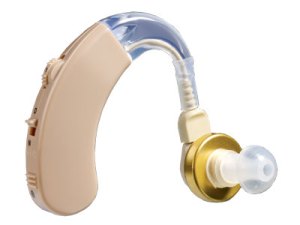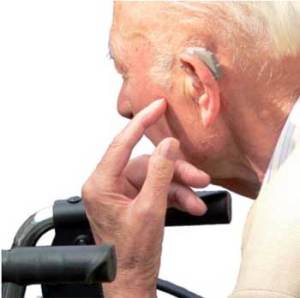Can you hear me?
A couple of years ago, two of my youngest cousins, who are actually identical twins, were diagnosed with a hearing disorder. It was first discovered by my aunt when she noticed how the twins didn’t respond whenever she called them or made any noise. Because they were just infants back then, the family first thought that the reason why they didn’t respond is because they still didn’t know their name considering their age and cognitive ability. My aunt then tried something different. She called the twins using her voice and tried different sounds to see if they would respond in any way. Both of them didn’t. But when she slammed the door (which created a very loud sound), both the twins were startled and reacted to it. The family then consulted a doctor and they were recommended to wear a hearing aid.
Hearing aids are electronic devices that are mainly composed of four things namely (1) one or more microphones, (2) an amplifier, (3) a receiver, (4) a battery. More advanced hearing aids also include (1) a computer chip, (2) on-off switch, and (3) a program that allows the user to choose among various listening environments. Hearing aids work by picking up and amplifying sounds. This process allows the user to hear what they would normally not hear since these sounds are increased in volume, and therefore better communicated. Basically, hearing aids work when sounds are gathered by the microphone and are then converted into electrical impulses. The amplifier increases the volume of these sounds, then the receiver coverts these electrical impulses back to sound waves and are redirected to the user’s ear.
Hearing loss is considered to be one of the most common birth defects around the globe, affecting about 3 out of 1,000 new born babies. Hearing loss not only affects babies, but can actually affect any person at any age. One of the most common forms of hearing loss is presbycusis, meaning ‘old hearing.’ This is usually caused by factors in relation to aging.
Hearing loss may be hereditary, or may be caused by an illness or an injury. Some of these are infections, head injuries, lack of oxygen, and diabetes. Also, listening to very loud sounds like music through the headphones or in factories may cause damage to the ears. Some types of hearing impairments are temporary. These may be cured through medications or surgery. But permanent damage to the ears cannot be cured. People with permanent hearing impairments then use hearing aids.
In earlier years, it was believed that hair cell regeneration was not possible after birth. Hair cells are neurons in the cochlea (a structure located in the inner ear) and are called the auditory receptor cells. These hair cells are primarily responsible for auditory transduction and the perception of pitch. It was only in the 1980s when scientists were able to experiment on mature bird cochlea, and found evidence that there was growth of hair cells in their cochlea after damage. Moreover, other researchers also discovered that the new hair cells were functional and restored hearing (including balance sensation). Various researches are ongoing to find if hair cell regeneration may be present in mammalian cochlea, and most especially, in humans. Hearing aids cannot fully alleviate hearing impairments, thus researchers are hopeful that in studying hair cell regeneration in humans, people with such deficiencies will be cured and function normally.
Having a functional auditory sensation has proven to be very important for our survival. Apparently, there is a term known as the auditory fitness for duty (AFFD) which refers to the possession of hearing abilities sufficient for safe and effective job performance. Employers use AFFD tests to assess the auditory sense of people to assure that they are functional. This is crucial in some jobs where hearing is very critical to safety and performance. The most common jobs where normal hearing abilities are vital are in operation of motor vehicles or aircraft, mining, firefighting, law enforcement, and in military.
It is very important that we know how to protect our ears. To end this blog, I would like to share some of the ways we could take good care of our ears and prevent hearing impairments. Studies have shown that some foods can actually lower the risk of age-related hearing impairments such as sweet potatoes, almonds and salmon. In this study, they found that people who ate the most carotenoid-rich food, fish high in omega-3 fatty acids and food with high vitamin E content reduced the risk of hearing loss by half.
Other ways to prevent hear loss are the following (1) Get hearing checked once in a while, (2) Use noise-cancelling headphones, (3) Pay attention to your genes, (4) Quit smoking, (5) Turn down the volume, (6) Use protection like earplugs and earmuffs when around loud noises, and (7) Use sound absorbing materials like rubber mats under noisy kitchen appliances.
Written by: Justine Ng
References:
- Tufts, J. B., Vasil, K. A., & Briggs, S. (2009). Auditory Fitness for Duty: A Review. Journal of the American Academy of Audiology, 20(9), 539-557. doi:10.3766/jaaa.20.9.3
- http://www.myfoxdetroit.com/dpp/health/certain-foods-may-lessen-hearing-loss-risk-20110927-ms
- http://www.aafp.org/afp/20000501/2759ph.html
- http://www.wired.com/entertainment/music/commentary/listeningpost/2006/03/70434?currentPage=all
- http://www.medicinenet.com/script/main/art.asp?articlekey=123392
- http://www.hearingaids101.com/how-hearing-aids-work.aspx
- http://www.hearingaids101.com/hearing-loss.aspx
- http://depts.washington.edu/hearing/InnerEarHairCellRegeneration.php








